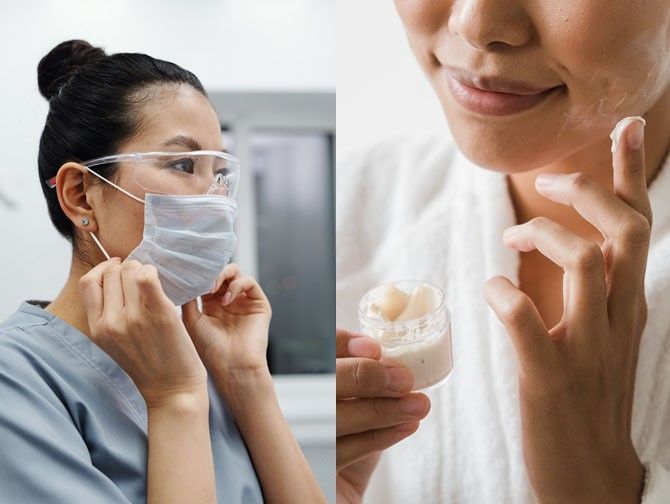How to keep your skin flawless during the pandemic


Wearing a face mask is going to be the way of life in the new normal. Even though Omicron has been less aggressive in terms of its symptoms, we still need to protect ourselves from getting it and to avoid from spreading it. According to the Centers for Disease Control and Prevention, wearing a face mask is an important health tool for preventing the spread of COVID-19 and that any mask is better than no mask. It’s going to be a while before we’d be able to go back to a mask-less world.
Last Wednesday, on our Pamilya Talk’s Okay, Doc episode, we had with us the medical director of the Montesa Medical Group, Inc., Dra. Anna Marie Montesa. We asked her about the different skin types and tips on how to take care of our skin during the pandemic. Wearing a mask can help save our lives but it does bring changes to our skin. The more we have our mask on, the more it has the capability to irritate our skin. Mask-related dermatitis and acne or “maskne” have been some of the skin issues that many of us are currently experiencing. Whether you’re young or old, these skin problems tend to be inevitable since frequent wearing of masks within long periods of time can cause blockage and clogging of pores, which results to breakouts. Here are some tips from Dra. Anna that might help you prevent this:
- Put a soft cloth mask inside the surgical one or put a soft tissue instead so you can replace it often.
- Use a non-irritating acne toner or antibacterial toner that you can use all over your face after using a facial wash with mild cleanser.
- Treat pimples with acne cream twice a day.
- Avoid comedogenic products (products which have a potentially pore-clogging ingredients).
- Dispose overly used masks since it might already be filled with dirt and bacteria. Regularly wash the cloth mask that you use.
- Wash the lower part of your face or the part being covered by your mask during break time with a mild cleanser and make sure to pat it dry.
- Try not to wear make-up underneath the area covered by your mask because this might contribute to the breakout and clog your pores.
- Give your skin a chance to breathe whenever possible.
(Caption: The more we have our mask on, the more it has the capability to irritate our skin. Dermatologist, Dra. Anna Montesa says, we must first know what kind of skin we have before we buy any skincare products. Photos from pexel.com)
Know your skin type
Granted that we’ve all been at home most of the time during the pandemic, neglecting our skin is not an excuse. But before we buy skincare products and apply it on our face and body, it’s vital that we take the time to do our research well or better yet, consult with our dermatological expert.
Fortunately, I have been blessed with good genes (thank you, mom and dad!). I never had acne issues growing up and hopefully, so will my kids. According to WebMD.com, acne usually starts during puberty at ages 10 and 13, and is worse on people with oily skin. Even though problems that concerns acne haunts adolescents, as per WebMD.com, 20% of acne problems occurs in adults.
“Before we buy any skincare products, we should first know what kind of skin we have,” reminds Dra. Anna. It’s also good to know your skin care goals—are you trying to prevent fine lines, discoloration, premature aging, etc. Here is a list of different skin types, as well as short tips on how to take care of them.
Normal skin
If you have not too oily and not too dry skin, you have a skin type like mine which is normal. A normal skin doesn’t have severe sensitivity, it’s vibrant, and has barely visible pores. It’s basically the holy grail of skin types. What I do to keep it clean and clear is I always wash my face with a mild facial wash, moisturize it, and I always apply sunblock when I stay outdoor.
Oily skin
Does your skin produce extra sebum, feels oily, and looks shiny most of the time? Chances are you have oily skin. “Usually, people who have oily skin are prone to having blackheads, whiteheads, that result to acne, and they also have enlarged pores,” says Dra. Anna. It’s good to have an antibacterial toner to use on your oily face after washing it with a mild facial wash. “If you’re not allergic, you can use gels, patch, cleansers with benzoyl peroxide and AHA (alpha hydroxy acid), and it would also be helpful to treat your pimples with antibacterial ointments.”

Combination skin
If your T-zone is shiny but the rest of your face is matte, you have combination skin. Having a combi skin is very tricky because according to an article from healthline.com, there’s no way to formulate a moisturizer that fits this type of skin, which is part dry and part oily. The technique is to switch between the products that you use, interchanging either morning or night or days. A tip from healthline.com says to use a balancing toner to avoid having breakouts.
Dry skin
The opposite of having oily skin. Having dry skin means there’s an underproduction of sebum, which leaves your skin flakey, tight, and prone to early wrinkles. “Usually people who have dry skin is prone to skin irritation, itchiness, and redness,” explains Dra. Anna. Only use mild soap to wash your face, as well as a toner with no alcohol content. “To prevent having wrinkles starting at an early age, you should start using a moisturizer but make sure that it’s light so it won’t block your pores that might cause blemishes and pimples.”

Sensitive skin
If your skin gets itchy, red, or inflamed, it means that you have a sensitive skin. A skin issue that happens to those with sensitive skin is atopic dermatitis or eczema. “Having atopic skin doesn’t allow you to immediately produce moisture in your skin therefore needing you to assist it by applying perfume-less, hypoallergenic products at least twice a day. Moisturizers with ceramides can also be used two times a day after washing your face and body to avoid having wounds,” says Dra. Anna. A suggestion from healthline.com is to also avoid skincare products with ingredients that have sulfates and paraben.
Of course, these tips are very helpful but it is still advisable that you personally visit your dermatologist to provide you a better evaluation of the best skin routine for you, or drop by Montesa Medical Group Inc. at Tomas Morato or Ayala Mall Circuit Makati or call 09176299671 to book a consult.
As early as now we must learn how to take care of our skin. Whether or not there’s a pandemic,
regularly wash your face to keep it clean and also moisturize to retain its suppleness. Also, an unwritten rule that should be in your skincare regiment is to use sunscreen whenever you go out the house, I kind of learned this the hard way. “Still use sunblock or sunscreen even when it’s cloudy because UV rays are still present,” reminds Dra. Anna. Also eat well, a balanced diet helps with maintaining the vibrancy of your skin. Having a clear skin will not stop the feeling of the crippling anxiety caused by the pandemic, but it is definitely a start.
--
Watch Pamilya Talk on Facebook, YouTube, and Kumu (@JingCastaneda – 4:15-5:00 p.m. Monday and Wednesday). You can also follow my social media accounts: Instagram, Facebook, YouTube, Twitter and Kumu. Please share your stories or suggest topics at editorial@jingcastaneda.ph.



















